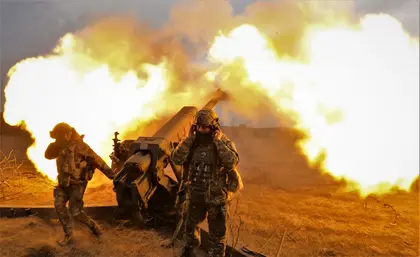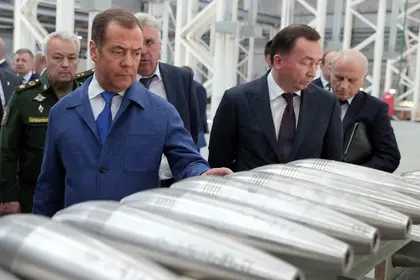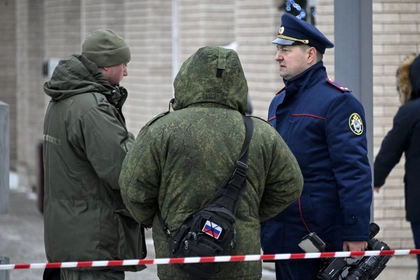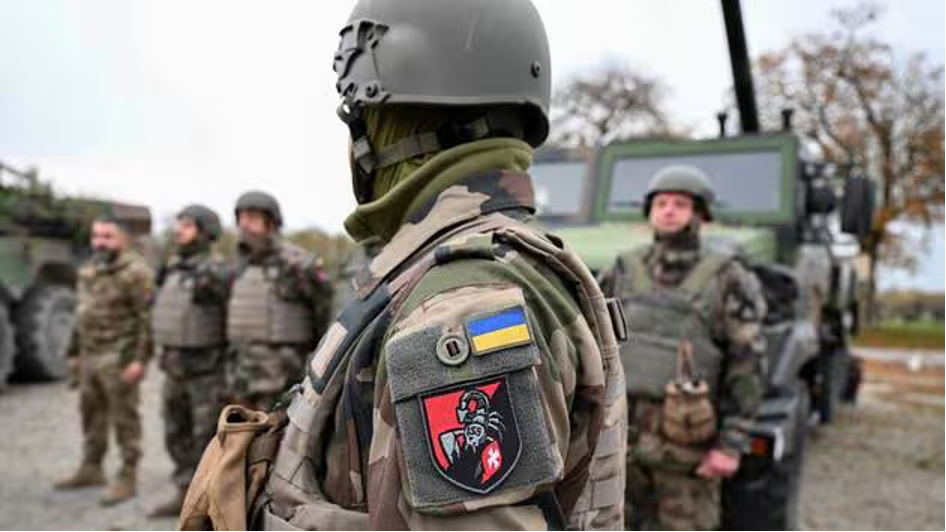Polling indicates that western support for Ukraine across Europe and the U.S. remains strong. Rumors persist in Kyiv, however, that the Ukrainian Presidential Administration fears that the West is watching the Battle of Bakhmut to decide, if Russia takes the town, whether the time is right to quit supporting Ukraine and to push for a negotiated peace with Russia. Do the rumors match the reality?
According to Western experts with whom the Kyiv Post spoke, it seems clear that Bakhmut in no way will drive the West's future decisions in regards to supporting Ukraine.
- Get the latest war in ukraine update from the Kyiv Post's daily news reports published today.
- See the most recently published Ukraine news reports from today.
JOIN US ON TELEGRAM
Follow our coverage of the war on the @Kyivpost_official.
Former British Lt. Col. Glen Grant, now a defense expert with the Baltic Security Foundation, explained that, "Bakhmut is politically important to Russia as Prigozhin has promised he can deliver it. Because of this - Zelensky believes that by keeping Bakhmut, he can defeat Prigozhin and Wagner, and therefore upset the Russian Army ... This is why there is a false value placed on Bakhmut."
But would any countries stop supporting Ukraine if Bakhmut falls? "The UK - absolutely not; Baltics - absolutely not, Poland - absolutely not; Finland - absolutely not; Sweden - absolutely not; Germany, absolutely - not," said the defense expert.
George Barros, of the Institute for the Study of War (ISW), expressed that "I don't assess that Western security assistance to Ukraine is contingent on Ukraine maintaining a successful defense in Bakhmut. It also depends on how you define 'success.' Bakhmut is not a strategic city and the city itself has little operational significance."

Ukraine Must Join the Joint Expeditionary Force, and the UK Should Lead the Way
The ISW analyst noted that "For Ukraine, their success is not in holding a city for the sake of holding a city, but they are using a naturally defensible city to bleed the Russians. This bleeding will pay dividends for Ukraine in the long run, if Ukraine eventually leaves Bakhmut. Even if Ukrainian forces make a decision to withdraw from the city it would be a tactical loss but an operational victory."
Michael McFaul, the former US Ambassador to Moscow and Stanford Professor succinctly stated that, "No, I do not think that would be the case."
A former Republican Congressman said that the U.S. was strongly committed to Ukraine, in spite of "Tucker Carlson's Kremlin propaganda."
Garry Kasparov, who has been actively traversing the Atlantic, meeting political leaders to whip-up support for Ukraine, said that he did not know the specifics, but would "doubt it."
American Malcolm Nance, who spent three decades in military intelligence and was in the Ukrainian Foreign Legion, says "Not at all," and that "Ukraine is not a small town. Ukraine is not a village. Ukraine is not even a city like Kramatorsk. If such a rumor were true, then why did the west not stop supplying weapons after Severоdonetsk or Lysychansk fell? Bakhmut is a graveyard for PMC Wagner. It is also a warming table for the spring offensives."
"Not being inside the government, but having spoken to a lot of global military figures who support Ukraine, I do not think there is any association between what happens in Bakhmut and Western support. I think that it is a myth to justify holding the town - which really no longer has a tactical advantage to holding on, as it has been destroyed," argues David Plaster, an American veteran who has been training troops in Ukraine since before the war broke out.
Lithuanian expert Gintare Narkaveciute replied that "Western allies are committed to Ukraine getting back to its 1991 borders and that is not something that depends on the Battle of Bakhmut. We will always be there for Ukraine.”
A Canadian military officer, when asked if the Western support for Ukraine would dissipate if Bakhmut falls to Russia, was emphatic, saying, "absolutely not."
Darius Jurgelevicius, who was a career diplomat before becoming the Deputy Director of the Lithuanian intelligence service, said that, "Why should it? Bakhmut's importance, from a military perspective, has never been unanimous and military experts had evaluated its importance at different levels. If that happens it should not cause any change in the western approach towards this war - it would be just one painful loss but not defeat; I guess no one in the West would consider pressuring Ukraine to accept a ceasefire under the condition that part of sovereign country has been occupied and annexed."
Eerik Kross, a Member of the Estonian Parliament and former Director of the Estonian intelligence service is even more categorical. “I do not think a Ukrainian retreat from Bakhmut would have any impact on western assistance,” he says. “If anything, it would give another argument to increase it. However, the success of the expected Ukrainian counter-offensive, no matter in which direction it might happen, will have an impact on the further planning of military assistance. Both Ukraine and the West need it to be a success.”
"I think that’s total BS. Bakhmut is an attritional battle— it's fixing the Russians in the area," said Chuck Pfarrer, a military analyst and former US Navy SEAL officer, continuing that "I actually think [western] help [for Ukraine] would increase if Ukraine lost Bakhmut."
Gary Tabach, who regularly resides in Kyiv and served as a US Naval Officer at the US Embassy in Moscow, said that he had not heard that the West's support for Ukraine depended on Bakhmut.
"Not at all," says Adam Starzynski, a Polish political analyst, "There were even reports that the West was advising Zelensky to focus on Zaporizhia and was surprised that Ukraine was putting so much focus on Bakhmut." In regard to Polish support specifically, Starzynski replied that "Of course, what happens in Bakhmut will not change Polish support at all. The Poles are confident that with all of the armor that Ukraine has received in the recent weeks: Tanks, planes, APC - the Poles understand that a counteroffensive is coming as soon as the mud dries up. No matter what happens in Bakhmut, Poland remains committed to Ukraine and to the coming counteroffensive."
Steve Nix, the Eurasia Director of the International Republican Institute (IRI) in Washington, DC said that the "United States' President has said publicly that strategic decisions in regards to Bakhmut is something that Ukraine should decide, explaining that the view of the White House is that "it is Ukraine's call as to what happens."
Ivana Stradner, a Research Fellow at the Foundation for Defense of Democracies, was direct in saying that "I don't think the West will stop supporting Ukraine if Bakhmut falls."
Perhaps giving insight as to the origins of the baseless rumors of Bakhmut's importance, Stradner stated that "This is so typical of Moscow's information operation tactics." If Bakhmut falls, "Russia will launch information operations targeting the far-right and the far-left isolationists with messages such as 'your government is wasting money on Ukraine yet Russia is winning.' They will likely also talk about how the Ukrainians are used by the West as cannon fodder and Ukraine must negotiate a peace agreement with Russia.'
This is precisely why it's important for foreign intelligence to anticipate such narratives and prepare an offensive campaign to counter Russia in the information space. Whoever controls the information space will win this war, because perception matters. Given that Ukraine can only win with western support, this is precisely why we need to create an informational environment that is free from Russia's deceptions and lies."
Despite the many rumors of Western support depending on the future of Bakhmut, western experts seem to be quite united in believing that the West's support would remain unchanged if the beleaguered city were to fall.
You can also highlight the text and press Ctrl + Enter






